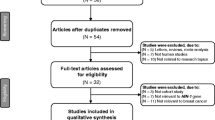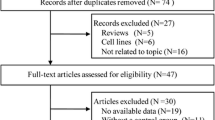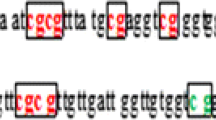Abstract
Cadherin-1 (CHD1), as an invasion suppressor gene, could suppress tumor cell invasion and metastasis in various tumors, but reduced CHD1 levels, resulting from epigenetic silencing, are common in poorly differentiated, advanced stage carcinomas. This meta-analysis was performed to evaluate the relationships between promoter methylation of CHD1 and breast cancer. Relevant studies were retrieved from the Web of Science (1945 ~ 2013), the Cochrane Library (Issue 12, 2013), PubMed (1966 ~ 2013), EMBASE (1980 ~ 2013), CINAHL (1982 ~ 2013), and the Chinese Biomedical Database (CBM) (1982 ~ 2013) using a systematic literature search. Results were summarized by meta-analyses, conducted using the STATA software (version 12.0, Stata Corporation, College Station, TX, USA). Odds ratios (ORs) and 95 % confidence intervals (95 % CIs) were calculated. In the present meta-analysis, 9 cohort studies with a total of 425 patients with breast cancer were included. Our meta-analysis results demonstrated that the frequency of CHD1 promoter methylation in cancer tissues was significantly higher than that in normal tissues, adjacent tissues, and benign tissues (cancer tissue vs. normal tissue OR = 30.87, 95 % CI = 16.76 ~ 56.86, P < 0.001; cancer tissue vs. adjacent tissue OR = 23.30, 95 % CI = 12.85 ~ 42.26, P < 0.001; cancer tissue vs. benign tissue OR = 2.94, 95 % CI = 1.60 ~ 5.40, P < 0.001; respectively). Ethnicity-stratified analysis indicated that aberrant CHD1 promoter methylation was strongly correlated with breast cancer among both Asians and Caucasians in the majority of subgroups. Our results suggest that aberrant promoter methylation of the CHD1 gene may have a high frequency in breast cancer tissues. Thus, CHD1 methylation could be correlated with the pathogenesis of breast cancer.






Similar content being viewed by others
Reference
Jemal A, Bray F, Center MM, Ferlay J, Ward E, Forman D. Global cancer statistics. CA Cancer J Clin. 2011;61(2):69–90.
Siegel R, Naishadham D, Jemal A. Cancer statistics, 2013. CA Cancer J Clin. 2013;63(1):11–30.
Benson JR, Jatoi I. The global breast cancer burden. Future Oncol. 2012;8(6):697–702.
Mavaddat N, Antoniou AC, Easton DF, Garcia-Closas M. Genetic susceptibility to breast cancer. Mol Oncol. 2010;4(3):174–91.
Nelson HD, Zakher B, Cantor A, Fu R, Griffin J, O’Meara ES, et al. Risk factors for breast cancer for women aged 40 to 49 years: a systematic review and meta-analysis. Ann Intern Med. 2012;156(9):635–48.
Dal Maso L, Zucchetto A, Talamini R, Serraino D, Stocco CF, Vercelli M, et al. Effect of obesity and other lifestyle factors on mortality in women with breast cancer. Int J Cancer. 2008;123(9):2188–94.
Xue F, Willett WC, Rosner BA, Hankinson SE, Michels KB. Cigarette smoking and the incidence of breast cancer. Arch Intern Med. 2011;171(2):125–33.
Stephens PJ, Tarpey PS, Davies H, Van Loo P, Greenman C, Wedge DC, et al. The landscape of cancer genes and mutational processes in breast cancer. Nature. 2012;486(7403):400–4.
Cho YH, Shen J, Gammon MD, Zhang YJ, Wang Q, Gonzalez K, et al. Prognostic significance of gene-specific promoter hypermethylation in breast cancer patients. Breast Cancer Res Treat. 2012;131(1):197–205.
Celebiler Cavusoglu A, Sevinc AI, Saydam S, Canda T, Baskan Z, Kilic Y, et al. Promoter methylation and expression changes of CDH1 and P16 genes in invasive breast cancer and adjacent normal breast tissue. Neoplasma. 2010;57(5):465–72.
Lombaerts M, van Wezel T, Philippo K, Dierssen JW, Zimmerman RM, Oosting J, et al. E-cadherin transcriptional downregulation by promoter methylation but not mutation is related to epithelial-to-mesenchymal transition in breast cancer cell lines. Br J Cancer. 2006;94(5):661–71.
Berx G, Van Roy F. The E-cadherin/catenin complex: an important gatekeeper in breast cancer tumorigenesis and malignant progression. Breast Cancer Res. 2001;3(5):289–93.
Burkhardt L, Fuchs S, Krohn A, Masser S, Mader M, Kluth M, et al. CHD1 is a 5q21 tumor suppressor required for ERG rearrangement in prostate cancer. Cancer Res. 2013;73(9):2795–805.
Baranwal S, Alahari SK. Molecular mechanisms controlling E-cadherin expression in breast cancer. Biochem Biophys Res Commun. 2009;384(1):6–11.
Kim MS, Chung NG, Kang MR, Yoo NJ, Lee SH. Genetic and expressional alterations of CHD genes in gastric and colorectal cancers. Histopathology. 2011;58(5):660–8.
Dong LL, Liu L, Ma CH, Li JS, Du C, Xu S, et al. E-cadherin promotes proliferation of human ovarian cancer cells in vitro via activating MEK/ERK pathway. Acta Pharmacol Sin. 2012;33(6):817–22.
Shenouda SK, Alahari SK. MicroRNA function in cancer: oncogene or a tumor suppressor? Cancer Metastasis Rev. 2009;28(3–4):369–78.
Esteller M. Epigenetics in cancer. N Engl J Med. 2008;358(11):1148–59.
Prasad CP, Rath G, Mathur S, Bhatnagar D, Parshad R, Ralhan R. Expression analysis of E-cadherin, Slug and GSK3beta in invasive ductal carcinoma of breast. BMC Cancer. 2009;9:325.
Caldeira JR, Prando EC, Quevedo FC, Neto FA, Rainho CA, Rogatto SR. CDH1 promoter hypermethylation and E-cadherin protein expression in infiltrating breast cancer. BMC Cancer. 2006;6:48.
Zhang JJ, Ou YT, Wan WH, R. DG. Detection of free tumor-related DNA in the serum of breast cancer patients. Chin J Oncol. 2007;29(8):609-13.
Wang JX, Zhang QY, Liu SL, Wu HY, Zhao WH, Lu KP. Association between YY1 methylation of E-cadherin in breast cancer. Chin J Clin Oncol. 2012;16:1169–71.
Sebova K, Zmetakova I, Bella V, Kajo K, Stankovicova I, Kajabova V, et al. RASSF1A and CDH1 hypermethylation as potential epimarkers in breast cancer. Cancer Biomark. 2011;10(1):13–26.
Stang A. Critical evaluation of the Newcastle-Ottawa scale for the assessment of the quality of nonrandomized studies in meta-analyses. Eur J Epidemiol. 2010;25(9):603–5.
Zintzaras E, Ioannidis JP. HEGESMA: genome search meta-analysis and heterogeneity testing. Bioinformatics. 2005;21(18):3672–3.
Peters JL, Sutton AJ, Jones DR, Abrams KR, Rushton L. Comparison of two methods to detect publication bias in meta-analysis. JAMA. 2006;295(6):676–80.
Liu P, Li SR, Wang ZM. Detection of the methylation in the promoter area of RASSF1A and CDHl in human breast carcinoma tissue and serum. Acta Academiae Medicinae Weifang. 2010;32(2):94–6.
Graff JR, Herman JG, Lapidus RG, Chopra H, Xu R, Jarrard DF, et al. E-cadherin expression is silenced by DNA hypermethylation in human breast and prostate carcinomas. Cancer Res. 1995;55(22):5195–9.
Hu XC, Loo WT, Chow LW. E-cadherin promoter methylation can regulate its expression in invasive ductal breast cancer tissue in Chinese woman. Life Sci. 2002;71(12):1397–404.
Toyooka KO, Toyooka S, Maitra A, Feng Q, Kiviat NC, Smith A, et al. Establishment and validation of real-time polymerase chain reaction method for CDH1 promoter methylation. Am J Pathol. 2002;161(2):629–34.
Zou D, Yoon HS, Perez D, Weeks RJ, Guilford P, Humar B. Epigenetic silencing in non-neoplastic epithelia identifies E-cadherin (CDH1) as a target for chemoprevention of lobular neoplasia. J Pathol. 2009;218(2):265–72.
Pontoriero GF, Smith AN, Miller LA, Radice GL, West-Mays JA, Lang RA. Co-operative roles for E-cadherin and N-cadherin during lens vesicle separation and lens epithelial cell survival. Dev Biol. 2009;326(2):403–17.
Acknowledgments
This study was supported by the Science and Technology Research Project of Liaoning Province (No. 2012225016). We would like to acknowledge the helpful comments on this paper received from our reviewers.
Conflicts of interest
None
Author information
Authors and Affiliations
Corresponding author
Additional information
The Publisher and Editor retract this article in accordance with the recommendations of the Committee on Publication Ethics (COPE). After a thorough investigation we have strong reason to believe that the peer review process was compromised.
About this article
Cite this article
Gu, X., Xue, JQ., Zhu, X. et al. RETRACTED ARTICLE: Aberrant promoter methylation of the CHD1 gene may contribute to the pathogenesis of breast cancer: a meta-analysis. Tumor Biol. 35, 9395–9404 (2014). https://doi.org/10.1007/s13277-014-2235-z
Received:
Accepted:
Published:
Issue Date:
DOI: https://doi.org/10.1007/s13277-014-2235-z




